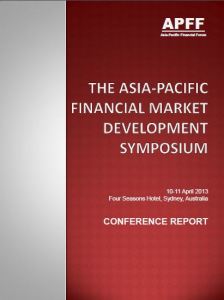
APEC Finance Ministers have taken a significant step by creating at their 2013 annual meeting in Bali an informal, inclusive and advisory public-private platform for collaboration in developing the region’s financial markets, as proposed in the report of the Sydney Symposium. The symposium was co-organized by ABAC and hosted by the Australian Government in Sydney on 10-11 April 2013.
This platform, the APFF, seeks to focus on important issues to help identify measures that will enable market participants to more effectively direct their commercial activities to support the development and integration of the region’s financial markets, and complement ongoing regional and international initiatives and enhance synergy among them.
 2013 Voice of the Symposium
2013 Voice of the Symposium
 APFF Sydney Symposium Report 2014
APFF Sydney Symposium Report 2014

APFF Work Program
The Sydney Symposium identified priorities for an initial APFF work program.
These priorities were selected based on their expected impact, complementarity with ongoing initiatives, and suitability for yielding tangible results within a short- to medium-term time frame. This work program has been developed through a collaborative effort by financial market participants and multilateral, public sector and academic institutions coordinated by ABAC through its Advisory Group on APEC Financial System Capacity Building. It is organized around five work streams:
• insurance and retirement income;
• lending infrastructure;
• trade and supply chain finance;
• financial market infrastructure and cross-border practices; and
• capital markets.
In addition, APFF will also examine linkages and structural issues, involving a group of leading institutions and experts, who will conduct regular strategic-level discussions to deepen understanding of significant policy and regulatory issues and their impact on financial markets. These discussions will include public sector institutions, business, standard setting bodies, multilateral organizations, academia and other relevant stakeholders.

APFF Insurance and Retirement Income Work Program
This work stream aims to promote policies and regulations supporting insurers’ and pension funds’ long-term business roles and provide advice on the development and funding of retirement systems to foster sustainable institutions, as well as on economic incentives and financial literacy initiatives. Its work will focus on the following areas:
Regulation and accounting
The work stream will seek to identify regulatory, accounting and other issues that constrain insurers and pension funds from effectively providing long-term funding, supporting financial stability and economic and infrastructure development and serving the needs of aging societies(*).
To address these issues, it will develop high-level principles on global standards and regulatory, accounting and solvency regimes to promote long-term business.
Long-term investments and capital markets
The work stream will identify ways to address market, regulatory and operational issues that affect the ability of insurers to make long-term investments in the region, in coordination with related work being undertaken in other APFF work streams.
Longevity solutions
The work stream will seek to develop high-level principles to address demand- and supply-side issues in the development of lifetime retirement income solutions. The main challenge on the demand side is ensuring sufficient retirement funding or cross-generational support for retiring individuals given the persistent bias of most consumers in the region against investment products like annuities that provide benefits later in return for payments an urgent issue in the face of the impending retirement “tsunami.” On the supply side, the main issue is insurance companies’ manufacturing flexibility (the ability to manufacture lifetime income solutions, which depends on being able to invest in assets that can match the long term liability of longevity products).
(*) Examples of such issues identified in the Sydney Symposium:
• application of regulatory requirements derived from bank-oriented regulations that are not appropriate to the insurance industry and negatively impact insurers’ stabilizing role in financial systems;
• short-term oriented economic accounting and solvency regimes that incentivize insurers to transfer risks to consumers, shift away from long-term protection business and investments and discourage them from investing in assets other than fixed income; and
• adoption of regulatory requirements based on “one-size-fits-all” models that do not sufficiently take into account variation of insurance products and insurers’ roles, needs and consumer behavior and development stage across markets and produce unexpected negative consequences for insurance markets.
